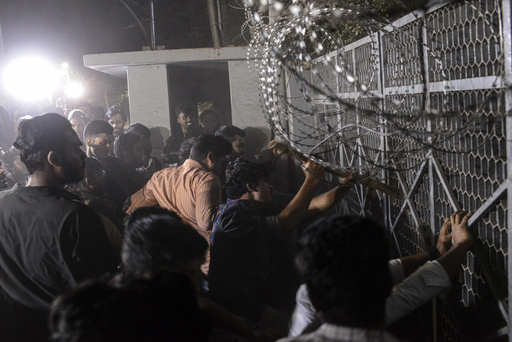DHAKA, Bangladesh — A massive protest erupted in Bangladesh on Wednesday as thousands expressed their outrage toward exiled former Prime Minister Sheikh Hasina by vandalizing a historic family residence that represents both the nation’s hard-fought independence and, according to the protesters, the authoritarian regime she supposedly established.
The unrest was ignited by a speech Hasina intended to deliver to her supporters from her sanctuary in India, where she had sought refuge following a brutal student-led revolt against her nearly 15-year administration. Opponents have long accused her of stifling dissent and crushing political opposition.
The targeted home in Dhaka was once the property of Hasina’s father, Sheikh Mujibur Rahman, who was a key figure in Bangladesh’s struggle for independence and famously declared the country’s separation from Pakistan at that location in 1971. Tragically, he was murdered there in 1975, and Hasina later transformed the residence into a museum dedicated to his legacy.
Since her flight from Bangladesh, some of her loyalists attempted to gather at the site but faced violent confrontations from her detractors, who have also targeted various other symbols associated with her governance, leading to widespread vandalism and arson across numerous locations.
As protests intensified on Wednesday, many vowed to demolish the house if Hasina proceeded with her speech, which was intended to initiate a month of demonstrations organized by her Awami League party. This party is currently scrambling for public support amidst accusations of assaults on its members and allies.
While Hasina began her address, protestors invaded the historic house, actively tearing down its brick walls, and later employed machinery, including a crane and excavator, to complete the demolition.
“They do not have the power to erase the country’s independence with bulldozers. They may tear down a structure, but they will fail to obliterate our history,” Hasina remarked during her speech, despite the ongoing destruction. She further urged the populace to resist the country’s new leadership, alleging they assumed power through “unconstitutional” methods.
Hasnat Abdullah, a prominent student leader, had cautioned media outlets about Hasina’s planned speech, declaring on social media that “tonight Bangladesh will be liberated from the shrine of fascism.”
Many demonstrators chanted demands for Hasina’s execution in connection with the hundreds of casualties that transpired during last year’s protests, which are among the most significant instances of unrest the country has experienced since achieving independence. Hasina recently called for a United Nations investigation into those deaths.
Protesters also expressed grievances against India. In Bangladesh, an interim government led by Nobel laureate Muhammad Yunus has called for Hasina’s extradition, yet India has remained silent on the matter.
Reports from the leading English-language newspaper, the Daily Star, indicated that overnight attacks targeted properties and businesses linked to Hasina’s supporters, signaling a rise in violence as the interim government struggles to maintain stability and prevent mob justice.
The interim administration has leveled allegations against Hasina regarding corruption and human rights violations throughout her rule, which commenced in 2009. Conversely, Hasina’s party has accused the Yunus-led government of committing human rights abuses and marginalizing minorities, allegations denied by the current authorities.
Human Rights Watch, based in New York, praised some reforms initiated by the interim government but also condemned a “worrying pattern of abuse” by security forces directed at Awami League supporters and journalists since Hasina’s removal.
A recent report highlights the resurgence of arbitrary arrests by police, along with the filing of extensive criminal charges against unidentified individuals, thus permitting law enforcement to intimidate the populace with the threat of detention.



